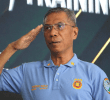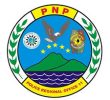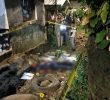
With his charismatic and no-nonsense persona, Mayor Rodrigo Duterte has succeeded in pleasing everybody. Why then is he risking his support from the progressive sector and from critics of the Arroyo administration by openly endorsing charter change?
By Marilou N. Aguirre
and Carlos H. Conde
DAVAO CITY (davaotoday.com) �When Rodrigo Duterte, the feisty mayor of this city, lashed out against the United States some years back for floating the idea of holding a joint U.S.-Philippine military exercise in his city, activists praised him for having the courage to stand up to Uncle Sam.
More recently, when President Gloria Macapagal-Arroyo decreed that protest marches were a threat to national security, Duterte went the opposite route, essentially telling leftists here not to mind the president.
Duterte, in other words, can be an activist�s greatest ally — which is why, to many of them, he can be a vexing problem.
Nothing illustrates this better than Duterte�s recent pronouncement that he was supporting Arroyo�s Charter change campaign.
�Government is in the doldrums,� he told viewers of his television program on April 2. �If that is the way to break the impasse, I will agree to charter change so we can move, so we can proceed to the next phase of our national life,� he said.
He was referring to the oft-repeated line by Arroyo that changing the Constitution would put an end to the country�s destructive and corrupt political culture. He said he would campaign for a �yes� vote to a referendum changing the constitution.
The city�s activists, who hoped � mistakenly, as it turned out — that Duterte would remain consistent in his nationalist positions, were stunned. Duterte�s open support for charter change pulled the rug from under the anti-charter change signature campaign led by Bayan, said Ariel Casilao, the group�s secretary-general. Casilao said that some Davaoenos had cited Duterte�s position when they refused to sign the anti-charter change petition Bayan was circulating.
Omar Bantayan of the Kilusang Mayo Uno said Duterte had clearly stated his position supporting the core advocacies of progressive groups: anti-globalization, anti-liberalization, anti-deregulation and anti-privatization.
�The proposed new charter strips away the protectionist economic guarantees stated in the provision on national patrimony, and allows foreign ownership of land, utilities, retail trade, media and educational institutions,� Bantayan said.
Duterte, he said, �has been very vocal against the plunder of foreign monopoly capitalists of our natural and human resources.� He hoped Duterte will remain consistent in his position.
But if there�s anything that can be said of Duterte, it is that he has always been consistent with the seeming contradictions of his policies and actions.
While openly admitting that the summary killings of suspected criminals — many of them children, many of them faced no formal charges — was his idea or that he was capable of legal shortcuts in going after criminals, Duterte, a former prosecutor, would emphasize the importance of the rule of law or that he would use the law even to the extreme to stamp out criminality.
He embraces the Left, even accepting and endorsing openly leftist personalities to his party, at the same time that he nurtures his relationship with the right, notably by agreeing to the creation of the Task Force Davao, which he has showered with his attention and resources.
He is perhaps the only mayor in the country who can go up the mountains to have lunch with communist leaders and come down the same day to have dinner with generals.
His anti-U.S. position was well-known and well-reported. He raised hell when the U.S. government spirited away Michael Meiring, the American who accidentally blew up his hotel room in May 2002, setting off speculation that he was a U.S. government spy out on a mission in Mindanao.
When terrorists bombed the Davao airport in 2003, Duterte�s tone changed. He told reporters that he would welcome U.S. help in fighting terrorism. �Things have changed,� he replied when asked about his anti-U.S. position in the past.
He has since resumed his anti-U.S. rhetoric. Two years ago, he made it clear that he did not want U.S. troops to hold military exercises in his city. �The Muslims, Bayan Muna, the business sector, the religious and the barangay leaders are opposed to it. So why will I do it when my people do not like it?” he was reported as saying. Almost 200 barangay officials even signed a manifesto opposing the entry of US troops here while the City Council unanimously approved a resolution �supporting the position of the city mayor against the conduct of the RP-US joint Balikatan military exercises.�
The question in the minds of many Davaoenos now is that why does Duterte do this sort of thing � firm in his position one moment, seemingly flip-flopping the next. A more interesting question, perhaps, would be: Why does he get away with it?
A possible answer lies in the issues and, more importantly, the political consequences for him, good or bad, each time he opens his mouth about these issues.
For example, after the bombing of the Davao International Airport in March 2003, Duterte said calling the Moro Islamic Liberation Front �rebels� was to dignify the group, which had been blamed by authorities for the attack. He urged the government to declare the MILF as a terrorist group � a sharp departure from his earlier position supporting the peace process.
On the surface, Duterte�s outburst against the MILF, which had repeatedly denied any hand in the attack, seemed understandable. He was, after all, devastated by the bombing, just as every Davaoenos had been. But did he lose political capital over it? Hardly. Under the circumstances, it might have been what Davaoenos wanted to hear.
The MILF at that time had been under tremendous pressure from the government and the international community over its alleged links with the terror network Jemaah Islamiyah.
To rail against the MILF after the attack was good for Duterte: it made him look tough and uncompromising against terrorism. Any backlash was easily trumped by his own credibility and charm as an effective mayor and a grieving father to the city.
Besides, he could always make up with the MILF later, which was exactly what happened after the Oakwood mutineers alleged that soldiers, not MILF militants, were behind the bombings not just of the airport but of the Sasa Wharf on April 2, 2003, and of mosques in Davao City the next day. Duterte and the MILF have since kissed and made up; he practically cleared the group of any terror links. He also publicly stated that he had no problems with Muslims in his city and that Muslims had a special place in his heart. (His son, Paolo, is married to a Muslim.)
In contrast, a contrary position on charter change can be politically disastrous for Duterte, who is still an ally of the president�s and who may need her and her party�s help in case the mayor runs for higher office.
In the end, it all boils down to rhetoric vis-�-vis policy. Railing against the MILF and the Americans was rhetoric, not policy. On the other hand, to make a clean break from Arroyo, as the activists apparently hoped, would be policy on Duterte�s part, something that will have far-reaching implications on his future political plans.
While he had openly supported the call to repeal the Oil Deregulation Law and the demand by workers for a wage increase, he also said, in the same breath, that he would leave the decisions on these issues to the �proper bodies� like the Supreme Court or the Congress.
Though his critics may characterize him as duplicitous, it is his talent for quotable rhetoric and exciting soundbite that makes him popular. In his TV program every Sunday, which is practically his pulpit, Duterte comes across as a no-nonsense and honest mayor. These qualities endear him to the people.
This is not to say that all of this is for show. Indeed, Duterte has practically opened his office to all people, most especially the poor. Sectors can easily approach him on issues such as the Local Tax Code, the water-rate hike, and the militarization in certain areas of the city and the region.
�Davao is a city that thrives in diversity,� Bantayan of KMU said. �We may hold different beliefs and ideologies, but we have critically collaborated and united on many issues (affecting) the interest of Davaoenos and the Filipino people.�
Still, it is clear that Duterte likes to play safe, a characterization shared by some leaders of activist groups in the city. He has a knack for identifying and supporting issues that he knows would earn him political points: the summary killings, which the middle class and the city�s elite seem to favor, and his alliances with both the Left and the military, to name just two.
Jeppie Ramada, the secretary-general of Bayan Muna, a group that has enjoyed Duterte�s support in past elections, put it this way: �He may have progressive views sometimes but he is still a politician.� (Marilou N. Aguirre and Carlos H. Conde /davaotoday.com)











